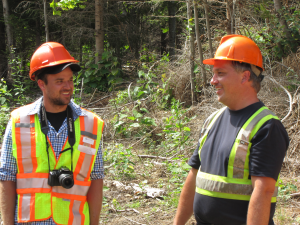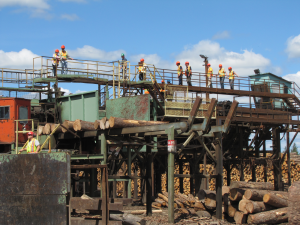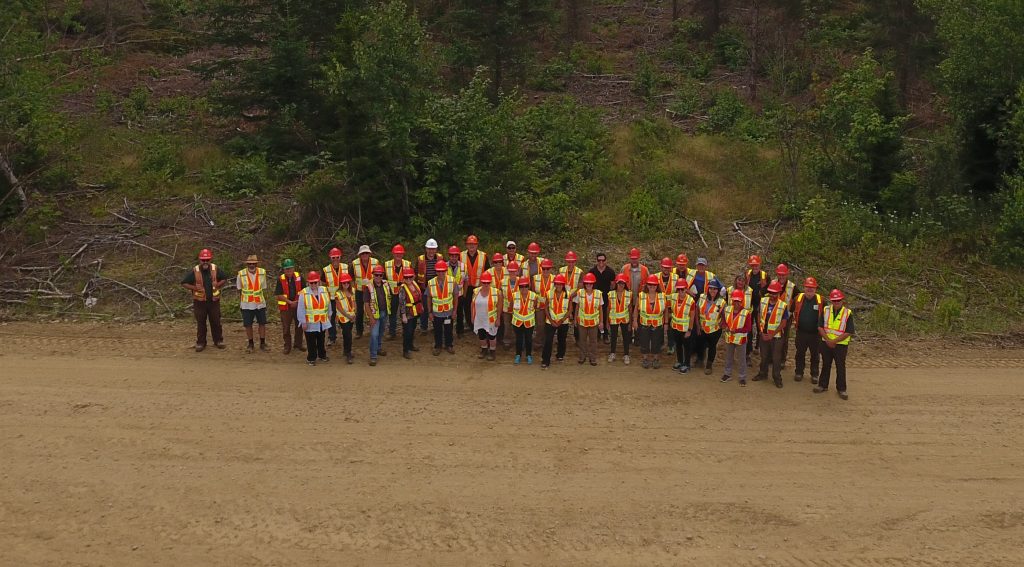‘Forestry 101’: Atlantic Teacher’s Tour 2016 A Great Success
With their summer coming to an end, 24 teachers took the opportunity to experience the forest industry first hand in this year’s 16th annual Atlantic Teacher’s Tour held August 8 to 11 in Miramichi.
The group consisted of teachers from all four Atlantic Provinces ranging from elementary to high school level with the goal of improving their understanding of one of the provinces most competitive and successful resource sectors.
“The tour is to provide our educators with a ‘first-hand’ view and a better understanding of what’s involved in managing our forest resource sustainably,” said Peter Robichaud, Executive Director of the Canadian Woodlands Forum.
The tour touches on important aspects of the industry, including forest management planning, applied research, technology in the sector, harvesting best practices, tree planting and natural regeneration, stand tending and vegetation management.
“We kick things off with ‘Forestry 101’”Robichaud states, “providing some fundamental elements of the forest resource i.e. soils, silvics, as well as background information on the sector.” Industry professionals take this time to share the scientific knowledge and research behind forest management practices.
From there, it’s straight into the woods to give the teachers hands-on experience with a live forestry operation. In the field, the group witnessed a commercial thinning at a regenerated stand that was clear-cut 35 years ago. Robichaud says this is an important part of the tour because it reinforces the dialogue regarding responsible and sustainable forest management.
Visits to the ARBEC oriented-strand-board mill, J.D. Irving Limited’s Value-Added Center and Delco’s lumber mill also gave the teachers a look at how the wood is processed after a harvest and the array of jobs provided by the forestry sector.
For Robichaud, exposing teachers to career opportunities in the sector is an important part of the tour. “They’re planting the seed with a lot of young people who will be the future leaders and potentially [forest] managers,” he said.
One stop on the tour was a visit along a section of forest where one side of the road had been treated with herbicide, and the other was not, providing the opportunity to explain why it is applied, the application procedure and to answer questions about herbicide as an effective management tool.
“Some have certain concerns in light of what they hear in the media and read in the paper, so we need to educate the educators,” Robichaud said. “They play a significant role in informing our young people with respect to resource management. All we’re trying to do is provide them with the information so they can make informed choices about what they teach.”
Science East Program Coordinator Becky Geneau also joined the group for a presentation on Envirothon, an annual high school science competition focusing on soils, aquatic ecology, forestry and wildlife. Geneau encouraged teachers to promote the competition at their schools to spark interest in resource management.
Todd MacPherson, a member of the organizing committee, found his first year participating in the event to be a rewarding experience.
“There were numerous times that teachers would make a comment like ‘wow, I never knew that,’” he said. As the Maritime College of Forest Technology’s Supervisor of Continuing Education, MacPherson explained to the teachers that students graduating from the college and the University of New Brunswick’s forestry program are highly sought after by employers for their hands-on experience in the field.
He is pleased with the tour because it gives forest industry professionals the opportunity “to show that we are responsible land stewards. Things aren’t just done on a whim, they’re carefully planned out and executed,” he said.
A new mentorship program, pairing an individual from the forestry sector with a teacher is being implemented this year to strengthen ties between schools and the forest industry. As an example, a math teacher interested in incorporating aspects of forestry into her course curriculum in the upcoming school year will be matched with a forester to provide support and resources.
What some had to say about their experience at the 2016 Atlantic Teachers’ Tour:
The tour has provided me with background knowledge to better lead discussions about forestry as a natural resource, and its impact on the environment as a result of management practices. It was a great eye-opener in terms of employment opportunities and new technologies. I now have a better understanding of the science and logic behind managing forests and selecting trees for cutting.
– Rachelle Levangie, Hilden Elementary School, N.S.
I will teach my forestry lessons with much more specific knowledge and will promote career opportunities to schools as both a counselor and a geography teacher.
– Bethany Toombs, Charlottetown Rural High, P.E.I.
A French language teacher’s tour will be held in St. Quentin on August 29-31:
http://teacherstour.com/fr



